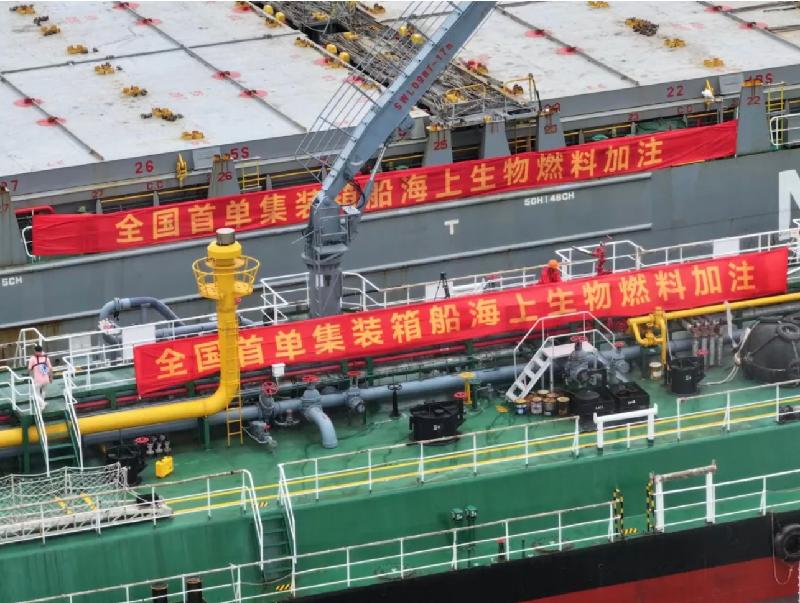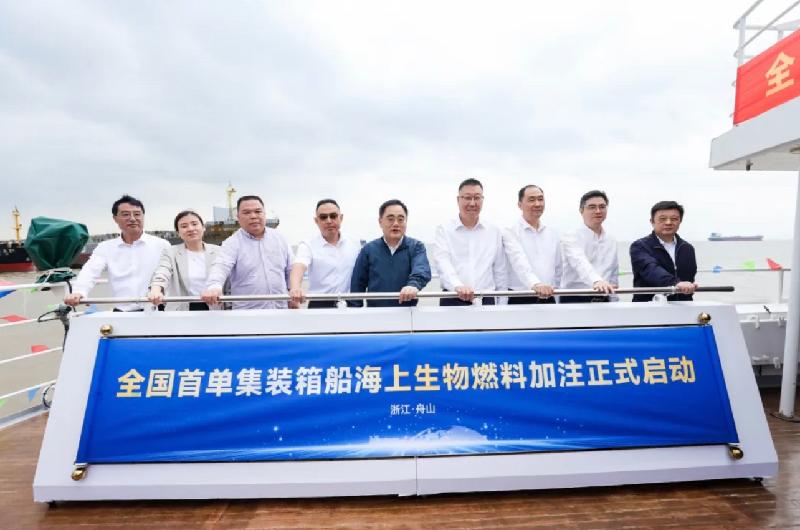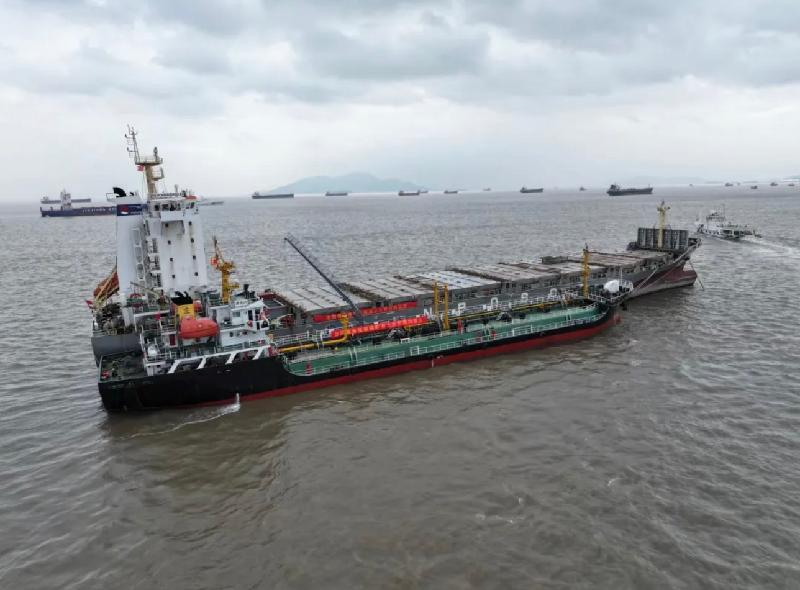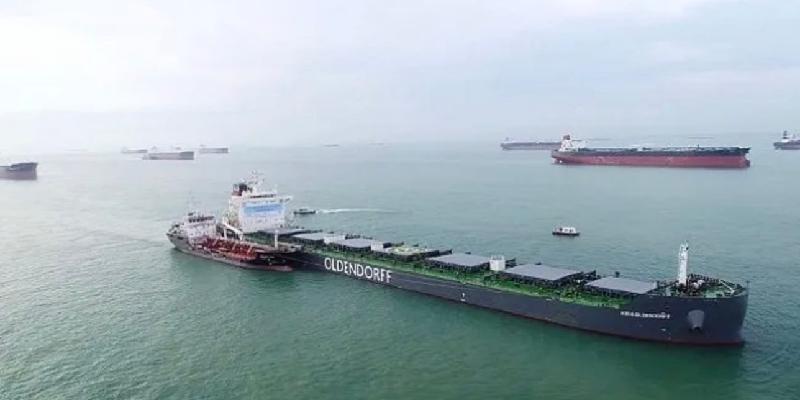
On October 9, at approximately 2:00 PM, the refueling ship MV SIJIE 21 commenced a ship-to-ship transfer of bonded biofuel oil to the Ningbo Ocean Shipping Company's container vessel "Xin Mingzhou 60" at the Mazhi Anchorage in Zhoushan. This event marked the successful execution of China’s first offshore biofuel bunkering operation for an international container ship.
At the launch ceremony, Gao Haomeng, Deputy Secretary of the Zhoushan Municipal Party Committee and full-time Deputy Secretary of the Zhoushan Archipelago New Area Party Working Committee, officially announced the start of the operation. He was joined by prominent figures including Sun Daqing, Deputy General Manager of Zhejiang Provincial Seaport Group and Ningbo Zhoushan Port Group, and other key officials from Zhoushan’s maritime, customs, and port authorities who observed the process on-site.

Chen Jiating, Deputy General Manager of Ningbo Ocean Shipping Company, highlighted the benefits of biofuel oil, particularly the B24 biofuel used in this operation, which consists of 24% biofuel and 76% conventional low-sulfur fuel oil. This blend meets the International Maritime Organization’s IS08217/2010 standards and can reduce carbon emissions by up to 21%. Chen emphasized that biofuel oil offers a convenient, energy-efficient, and environmentally friendly solution for shipping companies, as it can be used without modifying traditional vessels. Additionally, the institutional innovations developed during this operation, such as those concerning safety, pollution prevention, and product classification, provide a replicable model for similar operations nationwide.
As the maritime industry accelerates its decarbonization efforts, alternative fuels have become a focal point. Currently, the primary alternative fuels include LNG, methanol, ammonia, hydrogen, and biofuels like the one used in this operation. While LNG infrastructure is rapidly developing, its energy density is only about 55% of today’s very low sulfur fuel oil (VLSFO), and it poses the risk of methane leakage. Methanol, especially green methanol, offers significant emission reduction potential but faces supply challenges. Ammonia and hydrogen, although promising, present safety risks and lower energy densities.

Biofuels, now in their second generation, are produced from non-food crops, such as cellulose biofuels and waste biomass. Their key advantage is that they can be used immediately in existing engines or mixed with fossil fuels without requiring any modifications to the fleet, making them a practical and immediate solution for reducing carbon emissions across their lifecycle.
As major shipping companies set ambitious decarbonization goals, the adoption of green fuels like biofuel is becoming increasingly critical. COSCO Shipping, a pioneer in green shipping in China, conducted its first biofuel bunkering trial last year. On July 11, 2022, its container ship MV COSCO HOUSTON received a biofuel blend from TotalEnergies in Singapore, comprising 80% traditional VLSFO and 20% second-generation UCOME biofuel.

Singapore, the world’s largest bunkering port, has been at the forefront of exploring alternative fuels. Since 2021, the Maritime and Port Authority of Singapore (MPA) has encouraged suppliers and buyers to transition to green, low-carbon fuels. Singapore has now incorporated biofuel blends, LNG, and methanol into its monthly bunkering statistics, with biofuel sales reaching 52,600 tons in August, a 31.8% month-over-month increase.
Zhoushan, aiming to match Singapore’s achievements, began exploring alternative fuels last year, supported by local authorities and industry bodies. The Zhejiang Provincial Seaport Group, through its subsidiary Zhejiang Seaport International Trading Company, obtained ISCC-EU certification and prepared for the biofuel bunkering operation.

In May of this year, Cui Yiling, Deputy Director of the Zhoushan High-Tech Zone Management Committee, emphasized the urgent need for the shipping fuel industry to undergo a green transformation at the 2023 Zhoushan Bonded Marine Fuel Association Members Conference. Three months later, Zhoushan achieved a breakthrough with its first offshore LNG bunkering trial on August 24, when PetroChina’s Zhoushan branch successfully bunkered 2,200 tons of bonded LNG to a dual-fuel bulk carrier.
Following the successful completion of both LNG and biofuel bunkering operations, Zhoushan has become the first port in China to offer multiple green fuel bunkering services at sea. This strengthens its competitive edge in the global alternative fuel market and is expected to attract more vessels seeking sustainable fuel options.
Industry sources reveal that in addition to biofuels and LNG, Zhoushan has started exploring methanol bunkering. Leading fuel suppliers like Sinopec Fuel Oil and China Marine Bunker are also advancing their transition to green, low-carbon fuels, marking the beginning of a sustainable future for Zhoushan’s marine fuel industry.
Source: MarineCircle

